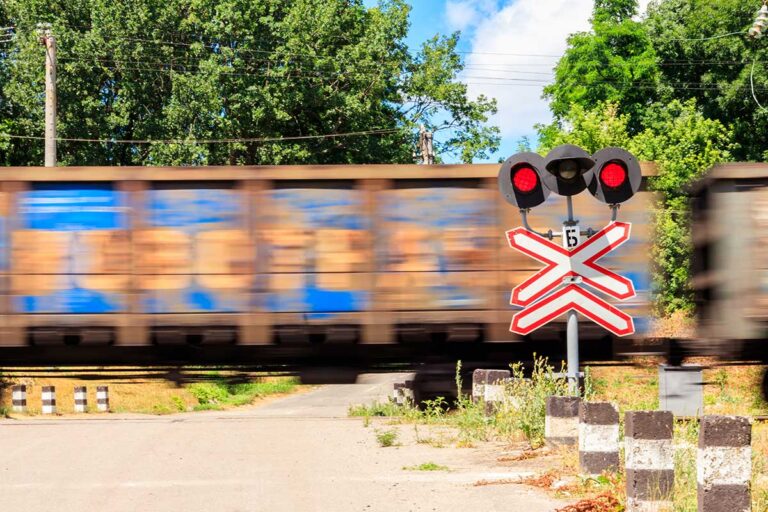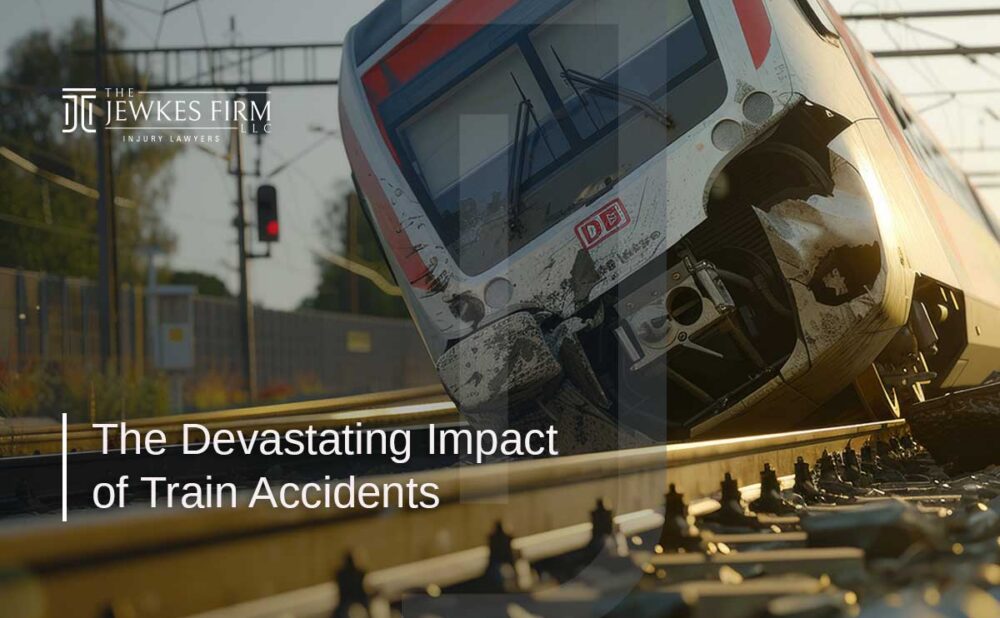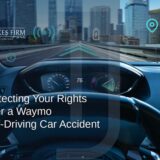The Devastating Impact of Train Accidents — Causes, Consequences and Legal Options
Train travel and freight transport play a crucial role in Georgia’s infrastructure, supporting commerce and daily commuting. However, the sheer mass and speed of trains often turn collisions, derailments, and crossing incidents into catastrophic injuries or wrongful deaths. Victims and families frequently face overwhelming medical bills, lost income, emotional trauma, and complex legal issues — which is where experienced legal advocacy becomes essential. Hence, understanding the nature of train accidents is vital for building a strong case.
At The Jewkes Law Firm, we understand the devastation caused by these accidents and remain dedicated to helping injured individuals pursue the justice and compensation they deserve. In this article, we explore the common causes of train accidents in Georgia, describe the impact on victims, and discuss the legal options available under Georgia law.
Injured In A Railroad Accident? Contact Us For A Free Consultation
Injured In A Railroad Accident?

Understanding Train Accidents
Train accidents can occur in various ways including:
- Railroad crossing collisions — where vehicles or pedestrians are struck at intersections
- Derailments — when trains leave the tracks due to track defects or equipment failures
- Collisions with other trains or obstacles
- Incidents involving maintenance workers or contractors on the tracks
Georgia Tops the Nation in Train Accidents, Injuries, And Deaths
Recent data released by the Federal Railroad Administration (FRA) of the U.S. Department of Transportation reveal that Georgia ranks among the highest in the nation for train-related accidents, surpassing even larger states in both size and population. Between 2018 and 2021, Georgia recorded a total of 277 train accidents, making it the state with the most incidents during this timeframe. Texas and Ohio followed closely, with 263 and 256 accidents, respectively. Moreover, during this period, Georgia reported 33 injuries and 9 fatalities related to train accidents, representing the highest numbers nationwide.
In 2025 alone, there were 1,870 highway-rail grade crossing collisions across the U.S., with Georgia being identified as one of the states with the highest number of incidents
These figures underscore ongoing safety concerns at railroad crossings and the need for enhanced safety measures in the state.
If you are among the many Georgians affected by train accidents, an Atlanta train accident attorney can help you recover compensation for your injuries.
Historical Accidents (For Perspective)
Georgia has a long history of serious train tragedies such as:
- The 1959 Meldrim trestle disaster, a derailment and LPG fire that killed 23 people near Savannah.
- The 1944 Stockton train wreck, caused by a broken rail and resulting in 47 deaths.
Recent Train and Railroad Incidents — Atlanta
There have been several recent railroad accidents and incidents in the Atlanta metro area and surrounding counties. These range from derailments with no reported injuries to a fatal collision involving a train and a vehicle:
Fatal Train‑Vehicle Collision — DeKalb County (Feb. 10, 2026)
- A CSX freight train struck a car at the North Clarendon Avenue and Ponce de Leon Avenue railroad crossing in Scottdale (near Avondale Estates) early Tuesday morning.
- The crash killed one person in the car and seriously injured another.
- The train crew reported no injuries.
- Authorities are investigating the cause.
Train Derailment — Palmetto / Fulton County (Feb. 6, 2026)
- Six CSX rail cars derailed near Wilkerson Road and Roosevelt Highway.
- There were no injuries, no hazardous material releases, and crews have been clearing the scene.
- The cause is under investigation.
Multiple Metro Atlanta Train Incidents Reported
Local outlets have noted that several accidents involving trains (including train derailments, collisions at crossings, pedestrian incidents, and near‑misses) have occurred in the metro Atlanta area over the past few months, highlighting ongoing safety concerns at crossings.

Common Causes of Train Accidents in Georgia
Train accidents in Georgia can arise from multiple (preventable) factors, often stemming from negligence or failure to adhere to safety regulations. The most common causes include:
Actions of Drivers and Pedestrians (Failure to Obey Signals or Trespassing)
Pedestrians or drivers illegally on tracks increase the risk of collisions. Many collisions at crossings happen because drivers ignore traffic signals, gates, or warnings designed to prevent accidents. Individuals attempting to beat trains at crossings or misjudging train speed remain serious risk factors in many collisions.
Distracted or Impaired Operators (Human Error)
Operator mistakes, dispatcher miscommunication, and lapses in judgment can compromise safety — from signaling errors to inadequate response to track conditions. Train engineers or vehicle drivers under the influence of alcohol, drugs, or distractions can cause severe accidents.
Mechanical Failures
Worn, defective, or improperly maintained train components such as brakes, wheels, or couplings can cause serious equipment failures.
Faulty Safety Equipment
Malfunctioning crossing gates, lights, and signals contribute significantly to collisions with vehicles and pedestrians.
Poor Track Maintenance
Neglected or damaged tracks can cause derailments and other accidents.
Speeding
Trains traveling too fast for conditions or curves can derail or fail to stop in time.
Consequences of Train Accidents
Train crashes often result in serious injuries or fatalities due to the sheer size and momentum of trains. Beyond physical harm, trains accidents cause:
- Severe Life-Altering Physical Injuries. Victims may suffer traumatic brain injuries, spinal cord damage, fractures, amputations, burns, or internal injuries. This results in permanent lifestyle changes, dependency needs, or long-term disability.
- Emotional and Psychological Trauma. Survivors and families may endure PTSD, anxiety, and depression.
- Property Damage. Vehicles and cargo can be totally destroyed.
- Financial Burdens. Medical debt, rehabilitation costs, lost wages and diminished earning capacity, and other expenses can quickly accumulate.
These effects ripple through families and communities, making timely legal action and compensation crucial.
Need a Free Consultation? Need a Skilled Attorney?
Free Consultation
Call (770) 771-5130
If you’ve been injured, you need to hire the best legal care to assist you with your claim. Get a FREE consultation today!
What Are Your Legal Options After a Train Accident?
Navigating the legal aftermath of a train accident can be complex. Multiple parties may share liability including:
- Train operators and railroad companies
- Vehicle drivers or pedestrians
- Municipalities responsible for maintaining crossings
- Manufacturers of defective equipment
At The Jewkes Law Firm, Attorney Jordan Jewkes has extensive experience in representing train accident victims in Georgia. Train accident claims involve complex interactions between state law, federal regulations, and insurance claims. Victims and families have multiple legal options available:
Personal Injury Lawsuits
In Georgia, if someone else’s negligence caused a train accident — such as the railroad company failing to maintain safe tracks or equipment — victims can file a lawsuit for compensation. Compensation may include:
- Medical expenses (past and future)
- Lost income and loss of future earning capacity
- Rehabilitation costs
- Disability-related expenses
- Loss of enjoyment of life
- Pain and suffering
- Emotional distress
- Funeral and burial costs (in wrongful death cases)
Comparative Negligence Rules
Georgia follows a modified comparative negligence system. This means:
- Your percentage of fault might lower your financial recovery.
- If you’re 50% or more at fault, you may not recover compensation.
Pursuing Claims Under Federal and State Laws
Train accidents fall under both federal regulations (such as those enforced by the Federal Railroad Administration) and Georgia state laws. Claims may involve:
Federal Employers’ Liability Act (FELA) Claims
Standard Georgia workers’ compensation laws do not apply to railroad employees. Instead, injured railroad workers must pursue claims under FELA — a federal statute that allows them to sue their employer for negligence.
FELA can provide broader compensation than workers’ comp, including pain and suffering and lost future wages — but it still requires proving negligence.
Negligence Claims Under Georgia Law for Other Railroad Accident Victims
In the state of Georgia, victims of railroad accidents have the right to seek compensation through negligence claims. When someone gets hurt due to the actions or inactions of another party, proving negligence is crucial to establishing liability. Within the context of railroad accidents, these claims can encompass a variety of situations, including collisions, derailments, and workplace injuries that occur on or near railway tracks.
In Georgia, to pursue a personal injury claim resulting from a railroad accident, an injured party must demonstrate that the railroad company or another involved party acted negligently. This often involves proving four key elements: duty of care, breach of that duty, causation, and damages. For example, if a train operator fails to adhere to safety regulations, leading to a collision, this could constitute a breach of duty.
Wrongful Death Claims
Families of train accident victims who die from their injuries can pursue wrongful death claims to secure financial support for funeral expenses, lost support, and emotional loss.
Dealing with Insurance Companies
Railroad companies and other defendants often have large insurance policies. Our law firm helps victims handle insurance negotiations, ensuring fair settlements and avoiding lowball offers.

GEORGIA RAILROAD ACCIDENT LAWYER NEAR ME
Why You Need an Experienced Train Accident Attorney
Victims of railroad accidents in Georgia must be aware of their legal rights regarding personal injury claims. Navigating the complexities of negligence law can be daunting, but understanding the fundamentals can empower victims to seek the compensation they deserve. By holding negligent parties accountable and pursuing appropriate legal action, injured individuals can begin the journey toward recovery and financial restitution.
Train accident cases are uniquely challenging because they often involve:
- Railroad corporations with powerful legal teams
- Federal safety regulations
- Multiple potential at‑fault parties (railroad operators, equipment manufacturers, crossing designers, and government entities)
An experienced lawyer helps you:
- Investigate the cause of the accident
- Preserve crucial evidence
- Interpret state and federal laws
- Negotiate with insurance companies
- Fight for maximum compensation
Take Action — Don’t Wait
Georgia law places strict deadlines (statutes of limitations) on filing personal injury and wrongful death claims. In many cases, victims have two years from the date of the accident to file. Some claims against government agencies can require shorter notice periods.
Waiting too long can jeopardize your claim — so seek legal guidance as soon as possible after a train accident.
The Jewkes Firm — Your Advocate in Georgia Train Accident Cases
At The Jewkes Firm, LLC, our team understands the devastating impact train accidents can have on victims and families. We stand ready to provide aggressive representation, compassionate support, and personalized legal strategy to help you pursue the justice and compensation you deserve.
If you or a loved one has suffered injuries in a train accident in Georgia, don’t wait to seek legal help. Contact The Jewkes Firm Injury Attorneys today at (770) 771-5130 for a free, confidential consultation with Attorney Jordan Jewkes. Let us protect your rights and guide you through every step of your train accident claim.
Frequently Asked Questions
What are the most common causes of train accidents in Georgia?
The leading causes of train accidents in Georgia include human error, defective railroad tracks, malfunctioning safety equipment, and mechanical failures. Additionally, train-vehicle collisions at crossings are common due to misjudgments by drivers and pedestrians.
What types of injuries commonly result from train accidents?
Victims often suffer traumatic brain injuries, spinal cord injuries, fractures, amputations, burns, and internal trauma, along with emotional distress like PTSD.
Who can be held liable after a train accident?
Liability may rest with train operators, railroad companies, vehicle drivers, municipalities in charge of crossings, or manufacturers of defective equipment.
Can I file a lawsuit if a train accident injured me in Georgia?
Yes, if someone else's negligence caused the train accident, such as poor track maintenance or operator error, you may recover compensation. It’s important to consult an experienced attorney promptly as legal deadlines apply.
What is FELA, and does it apply to railroad workers injured on the job in Georgia?
FELA (Federal Employers' Liability Act) is a federal law that protects railroad workers injured on the job. Unlike traditional workers' compensation, FELA allows workers to sue their employers for negligence, providing broader compensation, including pain and suffering.
How long do I have to file a lawsuit after a train accident in Georgia?
In Georgia, the statute of limitations for filing a personal injury or wrongful death lawsuit is typically two years from the date of the accident. However, if the claim involves a government entity or railroad company, shorter timeframes may apply, so it's essential to act quickly.
What compensation can I recover from a train accident claim?
Compensation after a train accident may include medical bills, rehabilitation costs, lost wages, pain and suffering, and in the case of a wrongful death, funeral expenses and loss of companionship.
Why should I choose The Jewkes Firm for my train accident case?
The Jewkes Law Firm offers personalized service, thorough investigation, aggressive representation, and works on a contingency fee basis—meaning no fees unless we win your case.




